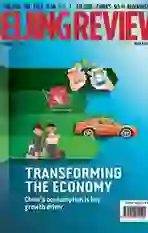Key Terms to Understand Reform and Opening Up
2019-03-10
The China Academy of Translation has analyzed prevailing terms concerning the reform and opening-up policy and translated them into a number of foreign languages. The research institute is affiliated with the China International Publishing Group, the countrys leading international publisher. In each issue, Beijing Review presents a selection of these terms to help readers more deeply understand this program.
Common Prosperity
Common prosperity is the fundamental principle of socialism with Chinese characteristics. As Deng Xiaoping pointed out,“Socialism is characterized not by poverty but by prosperity, the common prosperity of all.” Jiang Zemin stressed both performance and fairness, ensuring the general public benefi ts from the fruits of reform and development in every phase of socialist modernization. Hu Jintao advocated putting people fi rst, balanced development and social fairness. Xi Jinping said that it is the essential requirement of socialism to eradicate poverty, improve peoples livelihood and achieve common prosperity. It refers to a state in which the whole nation enjoys ample food and clothing through hard work and mutual help.
Achieving common prosperity does not mean that all will become prosperous at the same time, but that, where conditions permit, some areas and people may develop faster than others, and they will then help those that lag behind to catch up. China will adhere to the basic socialist economic system and income distribution system, adjust the pattern of national income distribution, step up efforts to adjust secondary distribution and work hard to narrow the income gap.
A New Path to Urbanization
Never in history has a developing country as large as China, with a population of over 1.3 billion, attempted to engineer a well-managed process of urbanization. China can no longer follow the beaten track of inefficient and blinkered development relying on borrowed money, which damages the environment and results in an imbalance between the needs of the population and land resources.
A people-centered approach is indispensable if we want to achieve the best results for urbanization. Appropriate plans should be worked out to ensure that towns and cities of all sizes complement each other, with well-defi ned functions for coordinated development. Eco-friendly measures should be effectively implemented in our push for green, circular and low-carbon development. Special care must be taken to preserve traditional cultures in our effort to redevelop cities and towns with historical landmarks and local or ethnic features.
Quality should be the first priority in the process of urbanization, with more emphasis on increasing the urbanization rate of residents with household registration, providing adequate public services in equal measure to both rural and urban areas, and building a more accordable and livable environment in towns and cities.
Chinas Strategy for a Talent-Driven Nation
A national plan of action to develop a quality workforce (2002-05) was released by the central authorities in May 2002. The plan included a strategy to invigorate the country through human resources development. In December 2003, a national work meeting on human resources made arrangements to speed up the implementation of the strategy. Talent development was underscored at the 17th and 18th National Congresses of the Communist Party of China (CPC) in 2007 and 2012, respectively. It was also incorporated in the report to the 19th CPC National Congress in 2017 as one of the seven strategies for completing the process of building a moderately prosperous society. The report stated, “People with talent are a strategic resource for China as it endeavors to achieve national rejuvenation and stay ahead of international competition.”
The strategy places human resources on the level of national importance. It underpins the vision that talent should be cherished as a primary resource and encourages the creation of favorable conditions whereby talented people emerge in great numbers and put their talents to best use. This will help enhance Chinas core competitiveness and composite strength and guarantee the building of a moderately prosperous society and the realization of the Chinese dream of national rejuvenation.
